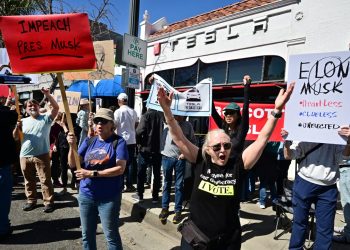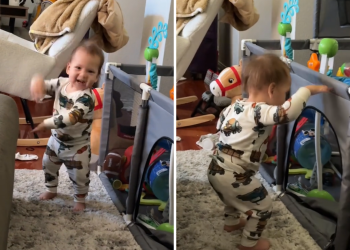
Photo: Ricardo Ramirez Buxeda/Orlando Sentinel/Tribune News Service via Getty Images
Imagine having so much money that you can promise million-dollar bribes to people who’d sign a petition “supporting” the First and Second Amendments. Well, billionaire Elon Musk actually did, flexing his considerable wealth to influence the election.
Now imagine how strong a movement needs to be to defeat political forces with that level of power and funding.
In March, Musk, who owns Tesla and supported Donald Trump, poured nearly $700,000 into an under-the-radar election in Austin, Texas. The money funded ads targeting the city’s district attorney, José Garza. A former public defender, Garza has implemented a slate of reform-minded policies like investing in gun violence prevention, expunging the records of people arrested for crimes but not convicted of them, and increasing funding for substance abuse programs.
The Musk-funded ads were shameless in their fearmongering.
One featured a bloody teddy bear with the caption: “José Garza is filling Austin’s streets with pedophiles and killers. The next victim could be your loved one.”
Musk alone outspent the incumbent district attorney 3-to-1, but Garza handily won the primary, receiving 66 percent of the vote.
No Crumbling Movement
While it would be easy to depict Garza’s victory as a notable upset against powerful political forces, the win would be better thought of as the continued success of the criminal justice reform movement, a movement whose victories in recent years outnumber its losses.
Reports of the death of the criminal justice reform movement, in other words, are greatly exaggerated.
Garza’s win would be better thought of as the continued success of the criminal justice reform movement.
There have been setbacks. Los Angeles District Attorney George Gascón suffered a recent high-profile loss.
Losses like Gascón, however, should not overshadow wins like that of Columbus, Ohio, District Attorney Shayla Favor, who opposes the death penalty and intends to eliminate cash bail. Or the reelection of Florida State Attorney Monique Worrell, who supports greater police accountability and is reclaiming her office after being removed by Republican Florida Gov. Ron DeSantis. Or the victory of Savannah, Georgia, District Attorney Shalena Cook Jones, who started a unit examining wrongful convictions and invested in alternatives to prison.
This is not the profile of a crumbling movement. These are elected prosecutors across the map winning races by implementing and then running on reform-minded policies.
Reform Works
The reason that deep pockets cannot defeat criminal justice reform is simple: The alternative just doesn’t work. People are beginning to realize we can’t incarcerate our way to safety.
Treating prison as the only solution to crime has given us the highest incarceration rate of any democracy on earth and a system in which three out of four prisoners are rearrested within five years of release.
Though it’s only been a decade since the criminal justice reform movement really picked up steam following the murder of teenager Michael Brown, our country has elected a record number of district attorneys who promise to shrink the size of the prison system and invest in measures that treat poverty, addiction, and trauma — the true root causes of most crimes.
Unlike rote incarceration, these reforms are achieving what should be the primary goals of the criminal justice system: improving safety and decreasing recidivism.
Research from the Vera Institute showed that, when compared to prison sentences, programs that divert defendants away from jail and into therapy or rehabilitation can, over a decade, cut reoffending rates in half and grow employment rates by nearly 50 percent. And New York University researchers found that defendants who were arrested, but not prosecuted, for low-level nonviolent offenses were 58 percent less likely to reoffend than defendants who were prosecuted.
Decades ago, virtually all elected prosecutors were “law-and-order” candidates, and anything else would have been unthinkable. But times are changing — and our approach to criminal justice must evolve too.
It’s naive to assume that the criminal justice reform movement will not hit speed bumps. Gascón, the high-profile LA district attorney who refused to charge minors as adults or pursue the death penalty, just lost his primary — by a lot.
The reasons for Gascón’s loss were not unique. He was unable to overcome the right’s tried-and-true strategy of playing on people’s fears about crime. Someone or something will always serve as the bogeyman that scares people into relying on prison as the only solution for crime.
Long Arc
Make no mistake, people have legitimate fears about their safety. And they are frustrated when the government seems unable to address visible signs of disorder like homelessness, substance abuse, or, in some places, retail theft.
It is no coincidence that the movement suffered losses in places where these issues were conspicuous; Los Angeles; San Francisco; and Portland, Oregon, are prime examples.
We have centuries of evidence, however, showing that prison is not an effective tool for addressing these issues — or crime in general. A shift is underway, but the movement will need time and resources to expand people’s imagination of what is possible.
In the same way that one loss in a playoff series does not doom a team, Gascón’s loss or other losses that may follow does not mean that the movement is crumbling. In fact, it is forcing conservative candidates to acknowledge and adopt reforms.
Even Gascón’s law-and-order opponent, Nathan Hochman, a former prosecutor who won the primary, promised to increase access to rehabilitation and publicly stated that not all crimes deserve jail time.
We should expect to see Musk and others like him throw money at future races where criminal justice reform is on the ballot. That’s why we need to continue to support, fight for, and invest in criminal justice reform.
In the words of José Garza, the district attorney who bested Musk: “It’s going to take what it always takes, which is people organizing. It’s going to take consistency.”




















